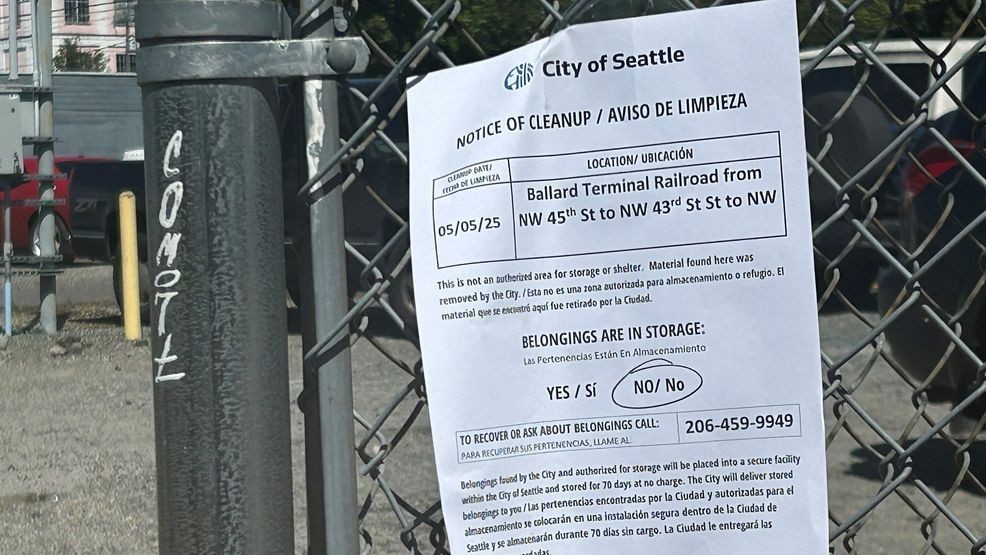SEATTLE — Seattle’s procedures around homeless camp removals have raised a lot of questions in Ballard, where neighbors said it seems people get cleared from one area just to set up tents in another.
The removals are handled by Seattle’s Unified Care Team (UCT), and on Monday, KOMO News had a chance to follow the team and see the process up close.
For about the past five weeks or more, an encampment had been occupying a section of the Ballard Terminal Railroad along a stretch just west of Leary Way NW. The tents and makeshift structures assembled there impacted train access through the area, according to city officials. It also created safety concerns for the 11 people who were living there.
Staff with UCT said outreach began on April 1, with site visits about once a week to check on people and see if any were willing to accept shelter as it became available. Last week, a determination was made that the people who remained were continuing to refuse shelter referrals and it was time to clear the location.
Notices were posted that people had until Monday before they would be forced to go.
One of the complaints KOMO News has heard from neighbors is that so much money is spent on clearing these encampments, but the problem never seems to get solved. Homeless people who are cleared from one site sometimes pack up their belongings and end up somewhere else on the streets a few blocks away.
As frontline workers, UCT staff said they have a very specific role in the process of addressing homelessness. UCT is a multi-department organization that includes the Human Services Department, Seattle Parks and Recreation, Seattle Public Utilities, Seattle Police Department, the Seattle Mayor’s Office, and others.
UCT staff members said their job is not to solve homelessness, which is a task assigned to the King County Regional Homelessness Authority (KCRHA). For its part, UCT is meant to keep public spaces accessible and welcoming to all while at the same time offering available services to people who need help.
UCT tries to do this work in a way that treats people with dignity and respect because staff said there is a likelihood that they will encounter these same people living on the streets somewhere else in the community. The outreach teams, which include a coordinator and two counselors for each city council district throughout Seattle, begin by trying to learn each person’s backstory and if they have any history of trauma.
Timing can be very important to convince people to accept the help that’s currently available. Sometimes it takes dozens of encounters and different encampment sites before people are ready, though there are others who will still refuse to come indoors. According to a spokesperson with the mayor’s office, last year, confirmed shelter enrollments reached the highest rate since UCT’s creation and was nearly 10% higher than in 2023.
When people are told they have to leave a location, UCT tries to show patience and will give them extra time to pack up their belongings so long as they cooperate with the process. Out of the 11 people living at the camp in Ballard, two accepted shelters, and two others were referred to specialized outreach providers based on their specific needs.
Even when people don’t accept help, UCT said their work has positive outcomes. That includes building relationships and learning people’s individual needs so they can get them the help they ask for once those services become available.
At the very least, they can complete the coordinated entry process to begin people down a pathway to enter permanent supportive housing.
UCT said another important benefit is removing trash and hazards from public rights of way. Many homeless camps have collections of propane tanks, gas canisters, syringes, and other assorted drug paraphernalia. UCT removed 4,700 pounds of debris from the Ballard Terminal Railway camp on Monday.
These efforts have helped improve public safety conditions related to encampments. For example, there was a 64% decrease in gunshots fired at encampments or involving someone experiencing homelessness, as well as a 45% decrease in encampment fires from 2022 to 2024.
Still, many in the community are frustrated by what seems to be a constant shuffling of homeless people from one location to another. UCT said the overarching goal is to try to get homeless people to make a change that will benefit both them and the community, though the immediate outcomes don’t always reflect that.
The Seattle city budget includes money for two additional non-congregate shelters, which could be opened later this year. Having private space with a door that closes could help convince more people to accept help and stop living on the streets.


